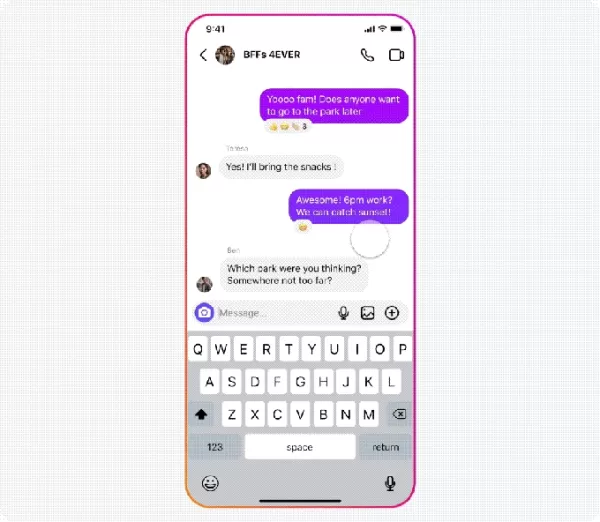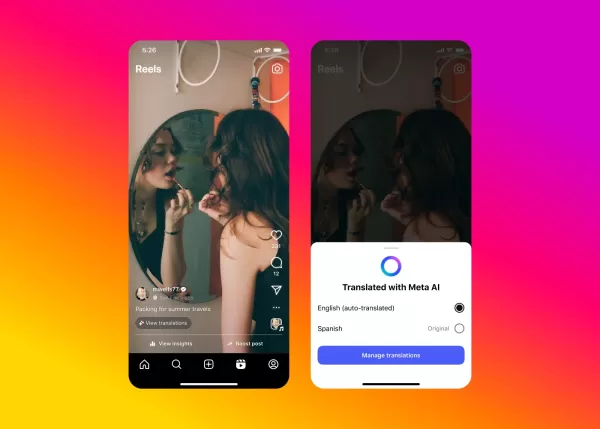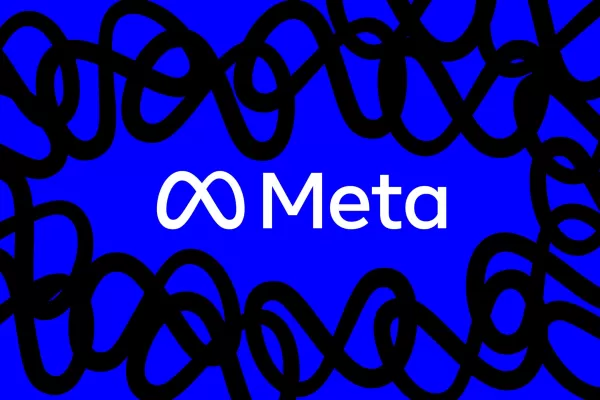Meta AI Launches in EU with Restrictions
Meta's AI-powered virtual assistant, Meta AI, has finally made its way to the European Union amid a heated regulatory battle with European privacy authorities. The company announced on Thursday that the chatbot-like tool will be integrated across its suite of social platforms, though with a more restrained set of features than what's available in the U.S. market.
In a separate development, Meta confirmed to TechCrunch that Meta AI will soon be accessible on WhatsApp in the U.K., expanding from its initial launch on Facebook, Instagram, and Ray-Ban Meta glasses back in October.
Since its 2023 launch in the U.S., Meta AI has dazzled users with its ability to chat, answer questions, generate images, and create stylish selfies. However, these creative features won't be part of the European version just yet.
 Meta AIImage Credits:Meta
Meta AIImage Credits:Meta
Last month, a text-based version of Meta AI was introduced in select countries across the Middle East and Africa. Now, starting this week, Meta AI will roll out to all 27 EU countries, plus an additional 14 European nations and 21 overseas territories, including Iceland, Norway, Serbia, and Switzerland.
Users will be able to interact with the assistant one-on-one across Meta's apps, and the tool will eventually be available in group chats as well. The rollout will begin on WhatsApp in both the EU and the U.K., with other platforms to follow.
Privacy Concerns
The EU launch of Meta AI represents the latest move by Meta to extend its AI capabilities across the region, despite ongoing regulatory concerns about using user data to train AI models. While Meta has been training its AI on user-generated content in the U.S. for years, the company has faced significant pushback in the EU due to strict privacy laws, including the General Data Protection Regulation (GDPR), which requires a valid legal basis for processing personal information.
Last May, Meta notified European users of an impending privacy policy update, signaling its intent to use their comments, interactions, status updates, photos, and captions for AI training. The company justified this by emphasizing the need for its AI to understand the diverse languages, geography, and cultural references of Europeans.
However, in June, Meta had to pause these plans after scrutiny from the Irish Data Protection Commission (DPC), its lead data protection regulator in the EU. The DPC criticized Meta's opt-out process, which required users to actively prevent their data from being used, instead of a more straightforward opt-in approach. Meta had been relying on the GDPR's "legitimate interests" clause, but the DPC disagreed, forcing the company to reconsider its strategy.
Meta confirmed to TechCrunch that the EU version of Meta AI hasn't been trained on local users' data, which is why it won't be seeking consent or notifying users. "The model powering these Meta AI features wasn’t trained on first-party data from users in the EU," said Anna Dack, Meta’s innovation communications manager for EMEA.
Meta faced similar regulatory concerns in the U.K., which operates under GDPR-based data protection laws post-Brexit. Last summer, the U.K.'s Information Commissioner’s Office (ICO) asked Meta to halt its AI training plans due to concerns about data usage. After adjusting the opt-out process to be slightly less cumbersome, Meta launched Meta AI in the U.K. without explicit objection from the ICO, though the regulator promised to keep an eye on developments. When asked if Meta's AI is trained on U.K. users' data, a spokesperson referred TechCrunch to a September announcement indicating that training on user content would begin "in the coming months," suggesting it hasn't happened yet.
Intelligent Chat
For now, the European version of Meta AI will focus on what the company describes as an "intelligent chat function" available in six languages: English, French, Spanish, Portuguese, German, and Italian. Essentially, it's a chatbot embedded within Meta's apps like WhatsApp, Instagram, Messenger, and Facebook. Users can activate the assistant by tapping a blue circle icon and ask any question they might typically search for online, such as how to perform a task or gather information on a topic.
The feature will also be introduced in group chats, starting with WhatsApp and soon expanding to Messenger and Instagram Direct Messaging.
Users can engage the assistant by typing "@MetaAI" followed by their query, whether it's recommendations for dinner spots or top tourist attractions in a city.
 Meta AIImage Credits:Meta
Meta AIImage Credits:Meta
While Meta touts the assistant's "advanced understanding" of user queries, it clarifies that this doesn't involve personalized suggestions based on user data. Instead, it's about making content searches more intuitive and user-friendly.
However, Meta sees this launch as just the beginning of its efforts to bring more AI to Europe, with plans to eventually match the capabilities available in the U.S. This suggests more potential conflicts with EU regulators, as Meta has been vocal about its criticisms of Europe's AI regulations.
TechCrunch reached out to the DPC for their response to Meta AI's EU launch. "The DPC, as Lead Supervisory Authority for Meta, has been examining Meta AI over recent months with our colleague Supervisory Authorities across the EU/EEA and we will keep it under review as it rolls-out to users over the coming weeks," a spokesperson stated.
Related article
 Meta's Zuckerberg Says Not All AI 'Superintelligence' Models Will Be Open-Sourced
Meta's Strategic Shift Toward Personal SuperintelligenceMeta CEO Mark Zuckerberg outlined an ambitious vision this week for "personal superintelligence" – AI systems that empower individuals to accomplish personal objectives - signaling potential cha
Meta's Zuckerberg Says Not All AI 'Superintelligence' Models Will Be Open-Sourced
Meta's Strategic Shift Toward Personal SuperintelligenceMeta CEO Mark Zuckerberg outlined an ambitious vision this week for "personal superintelligence" – AI systems that empower individuals to accomplish personal objectives - signaling potential cha
 Meta's AI Tackles Video Dubbing for Instagram Content
Meta is expanding access to its groundbreaking AI-powered dubbing technology across Facebook and Instagram, introducing seamless Video translation capabilities that maintain your authentic voice and natural lip movements.Revolutionizing Cross-Cultura
Meta's AI Tackles Video Dubbing for Instagram Content
Meta is expanding access to its groundbreaking AI-powered dubbing technology across Facebook and Instagram, introducing seamless Video translation capabilities that maintain your authentic voice and natural lip movements.Revolutionizing Cross-Cultura
 Meta AI App to Introduce Premium Tier and Ads
Meta's AI app may soon feature a paid subscription, mirroring offerings from competitors like OpenAI, Google, and Microsoft. During a Q1 2025 earnings call, Meta CEO Mark Zuckerberg outlined plans for
Comments (3)
0/200
Meta AI App to Introduce Premium Tier and Ads
Meta's AI app may soon feature a paid subscription, mirroring offerings from competitors like OpenAI, Google, and Microsoft. During a Q1 2025 earnings call, Meta CEO Mark Zuckerberg outlined plans for
Comments (3)
0/200
![ScottPerez]() ScottPerez
ScottPerez
 September 13, 2025 at 8:30:32 PM EDT
September 13, 2025 at 8:30:32 PM EDT
¡Al fin llega Meta AI a Europa! 🎉 Aunque con restricciones por las normativas de privacidad... ¿creéis que estas limitaciones afectarán mucho a su funcionalidad? Yo espero que al menos sea útil para buscar cosas en Instagram sin tener que salir de la app 🤔


 0
0
![LawrenceLee]() LawrenceLee
LawrenceLee
 July 27, 2025 at 9:19:05 PM EDT
July 27, 2025 at 9:19:05 PM EDT
Wow, Meta AI hitting the EU is big news! But with all those privacy restrictions, it feels like they're serving a watered-down version. 😕 Curious to see how it stacks up against other AI assistants in Europe!


 0
0
![RonaldNelson]() RonaldNelson
RonaldNelson
 July 23, 2025 at 12:59:29 AM EDT
July 23, 2025 at 12:59:29 AM EDT
Pretty cool that Meta AI is hitting the EU, but those privacy restrictions are a buzzkill. Wonder how it stacks up against other chatbots now? 😕


 0
0
Meta's AI-powered virtual assistant, Meta AI, has finally made its way to the European Union amid a heated regulatory battle with European privacy authorities. The company announced on Thursday that the chatbot-like tool will be integrated across its suite of social platforms, though with a more restrained set of features than what's available in the U.S. market.
In a separate development, Meta confirmed to TechCrunch that Meta AI will soon be accessible on WhatsApp in the U.K., expanding from its initial launch on Facebook, Instagram, and Ray-Ban Meta glasses back in October.
Since its 2023 launch in the U.S., Meta AI has dazzled users with its ability to chat, answer questions, generate images, and create stylish selfies. However, these creative features won't be part of the European version just yet.
 Meta AIImage Credits:Meta
Meta AIImage Credits:Meta
Last month, a text-based version of Meta AI was introduced in select countries across the Middle East and Africa. Now, starting this week, Meta AI will roll out to all 27 EU countries, plus an additional 14 European nations and 21 overseas territories, including Iceland, Norway, Serbia, and Switzerland.
Users will be able to interact with the assistant one-on-one across Meta's apps, and the tool will eventually be available in group chats as well. The rollout will begin on WhatsApp in both the EU and the U.K., with other platforms to follow.
Privacy Concerns
The EU launch of Meta AI represents the latest move by Meta to extend its AI capabilities across the region, despite ongoing regulatory concerns about using user data to train AI models. While Meta has been training its AI on user-generated content in the U.S. for years, the company has faced significant pushback in the EU due to strict privacy laws, including the General Data Protection Regulation (GDPR), which requires a valid legal basis for processing personal information.
Last May, Meta notified European users of an impending privacy policy update, signaling its intent to use their comments, interactions, status updates, photos, and captions for AI training. The company justified this by emphasizing the need for its AI to understand the diverse languages, geography, and cultural references of Europeans.
However, in June, Meta had to pause these plans after scrutiny from the Irish Data Protection Commission (DPC), its lead data protection regulator in the EU. The DPC criticized Meta's opt-out process, which required users to actively prevent their data from being used, instead of a more straightforward opt-in approach. Meta had been relying on the GDPR's "legitimate interests" clause, but the DPC disagreed, forcing the company to reconsider its strategy.
Meta confirmed to TechCrunch that the EU version of Meta AI hasn't been trained on local users' data, which is why it won't be seeking consent or notifying users. "The model powering these Meta AI features wasn’t trained on first-party data from users in the EU," said Anna Dack, Meta’s innovation communications manager for EMEA.
Meta faced similar regulatory concerns in the U.K., which operates under GDPR-based data protection laws post-Brexit. Last summer, the U.K.'s Information Commissioner’s Office (ICO) asked Meta to halt its AI training plans due to concerns about data usage. After adjusting the opt-out process to be slightly less cumbersome, Meta launched Meta AI in the U.K. without explicit objection from the ICO, though the regulator promised to keep an eye on developments. When asked if Meta's AI is trained on U.K. users' data, a spokesperson referred TechCrunch to a September announcement indicating that training on user content would begin "in the coming months," suggesting it hasn't happened yet.
Intelligent Chat
For now, the European version of Meta AI will focus on what the company describes as an "intelligent chat function" available in six languages: English, French, Spanish, Portuguese, German, and Italian. Essentially, it's a chatbot embedded within Meta's apps like WhatsApp, Instagram, Messenger, and Facebook. Users can activate the assistant by tapping a blue circle icon and ask any question they might typically search for online, such as how to perform a task or gather information on a topic.
The feature will also be introduced in group chats, starting with WhatsApp and soon expanding to Messenger and Instagram Direct Messaging.
Users can engage the assistant by typing "@MetaAI" followed by their query, whether it's recommendations for dinner spots or top tourist attractions in a city.
 Meta AIImage Credits:Meta
Meta AIImage Credits:Meta
While Meta touts the assistant's "advanced understanding" of user queries, it clarifies that this doesn't involve personalized suggestions based on user data. Instead, it's about making content searches more intuitive and user-friendly.
However, Meta sees this launch as just the beginning of its efforts to bring more AI to Europe, with plans to eventually match the capabilities available in the U.S. This suggests more potential conflicts with EU regulators, as Meta has been vocal about its criticisms of Europe's AI regulations.
TechCrunch reached out to the DPC for their response to Meta AI's EU launch. "The DPC, as Lead Supervisory Authority for Meta, has been examining Meta AI over recent months with our colleague Supervisory Authorities across the EU/EEA and we will keep it under review as it rolls-out to users over the coming weeks," a spokesperson stated.
 Meta's Zuckerberg Says Not All AI 'Superintelligence' Models Will Be Open-Sourced
Meta's Strategic Shift Toward Personal SuperintelligenceMeta CEO Mark Zuckerberg outlined an ambitious vision this week for "personal superintelligence" – AI systems that empower individuals to accomplish personal objectives - signaling potential cha
Meta's Zuckerberg Says Not All AI 'Superintelligence' Models Will Be Open-Sourced
Meta's Strategic Shift Toward Personal SuperintelligenceMeta CEO Mark Zuckerberg outlined an ambitious vision this week for "personal superintelligence" – AI systems that empower individuals to accomplish personal objectives - signaling potential cha
 Meta's AI Tackles Video Dubbing for Instagram Content
Meta is expanding access to its groundbreaking AI-powered dubbing technology across Facebook and Instagram, introducing seamless Video translation capabilities that maintain your authentic voice and natural lip movements.Revolutionizing Cross-Cultura
Meta's AI Tackles Video Dubbing for Instagram Content
Meta is expanding access to its groundbreaking AI-powered dubbing technology across Facebook and Instagram, introducing seamless Video translation capabilities that maintain your authentic voice and natural lip movements.Revolutionizing Cross-Cultura
 Meta AI App to Introduce Premium Tier and Ads
Meta's AI app may soon feature a paid subscription, mirroring offerings from competitors like OpenAI, Google, and Microsoft. During a Q1 2025 earnings call, Meta CEO Mark Zuckerberg outlined plans for
Meta AI App to Introduce Premium Tier and Ads
Meta's AI app may soon feature a paid subscription, mirroring offerings from competitors like OpenAI, Google, and Microsoft. During a Q1 2025 earnings call, Meta CEO Mark Zuckerberg outlined plans for
 September 13, 2025 at 8:30:32 PM EDT
September 13, 2025 at 8:30:32 PM EDT
¡Al fin llega Meta AI a Europa! 🎉 Aunque con restricciones por las normativas de privacidad... ¿creéis que estas limitaciones afectarán mucho a su funcionalidad? Yo espero que al menos sea útil para buscar cosas en Instagram sin tener que salir de la app 🤔


 0
0
 July 27, 2025 at 9:19:05 PM EDT
July 27, 2025 at 9:19:05 PM EDT
Wow, Meta AI hitting the EU is big news! But with all those privacy restrictions, it feels like they're serving a watered-down version. 😕 Curious to see how it stacks up against other AI assistants in Europe!


 0
0
 July 23, 2025 at 12:59:29 AM EDT
July 23, 2025 at 12:59:29 AM EDT
Pretty cool that Meta AI is hitting the EU, but those privacy restrictions are a buzzkill. Wonder how it stacks up against other chatbots now? 😕


 0
0





























